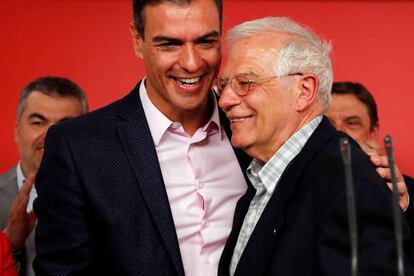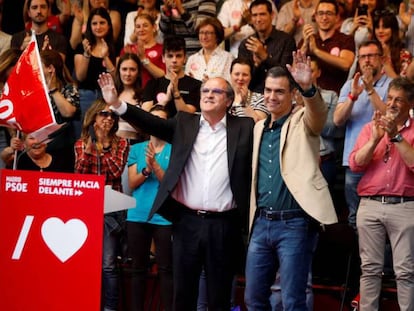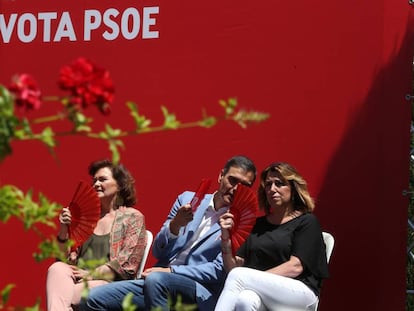Scattered votes in Spain
The need to reach deals forces parties to review their own strategies

The scattered votes at municipal and regional elections held yesterday in Spain make it necessary to distinguish between the gains made by some political forces, and whether this will actually allow them to form governing majorities.
This situation particularly affects the Socialist Party (PSOE), which again emerged as the country¡¯s top political force, as it did at the general election of April 28, thereby consolidating its reconstruction after a decade in crisis.
The strategy of closing itself off to deals has not yielded the desired results for Ciudadanos
As for the local elections, Madrid¡¯s Manuela Carmena could end up yielding the mayor¡¯s office to the Popular Party (PP) candidate if the latter manages to reach deals with Ciudadanos (Citizens) and the far-right Vox. For the PP, this would represent an important victory yet a symbolic one, because it would hardly make up for the severe loss of territorial power in some of its traditional strongholds.
In Barcelona, the most-voted party was the Catalan Republican Left (ERC), which opens the doors of City Hall to its candidate Ernest Maragall. But an alternative majority could emerge if the incumbent, Ada Colau, manages a deal with the Socialists and the candidate for Ciudadanos, former French Prime Minister Manuel Valls.
Many of Spain¡¯s regions are now facing a scenario of deal-making where Ciudadanos will play a decisive role. The party¡¯s strategy of closing itself off completely to any agreements with the PSOE, adopted personally by its leader Albert Rivera, has not yielded the desired results: Ciudadanos has not overtaken the PP as the main right-of-center force in Spain. Voters did not grant Rivera the role of opposition leader at the general election of April 28, and they did not do so indirectly yesterday, either.
Unidas Podemos alliance slumped at the polls due to its leaders¡¯ mistakes
This gives PP leader Pablo Casado some breathing room, while Rivera is now forced to confront the consequences of a mistake that affects not just his own party, but the entire system, because it closed off the space in the political center in exchange for precisely nothing.
It will not be easy for Rivera to retrace his steps on a road that he went down further than was reasonable, when he announced he was cordoning off democratic forces ¨C namely the PSOE ¨C while reaching deals with the far right. Now, it seems that the system will depend to a greater degree than ever before on such deals with the hard right. For Rivera, it is not so much his project as his entire leadership that he has gambled with by playing this all-or-nothing game across the board.
The socialists now face a paradoxical situation: they have made gains in just about every region and municipality of Spain, yet may not be able to form a government in some of the main ones, and even stand to lose some of the localities they secured at the last elections.
The anti-austerity Unidas Podemos alliance slumped at the polls due to its leaders¡¯ mistakes, dragging the entire political left down with it. This could also have an impact on the formation of a central government, since Podemos leader Pablo Iglesias¡¯ demands for a coalition with the PSOE and portfolios for his own party are now weakened after Sunday¡¯s poor showing. The campaign rhetoric about Unidas Podemos being the champion of socially-oriented policies has not received voter support at any level.
The strategy of drawing red lines between democratic parties cannot be maintained without including the far right in governing majorities. Rather, it is one more step on the road toward the normalization of anti-establishment forces, and this is something that Ciudadanos and the PP should not trivialize.
English version by Susana Urra.
Tu suscripci¨®n se est¨¢ usando en otro dispositivo
?Quieres a?adir otro usuario a tu suscripci¨®n?
Si contin¨²as leyendo en este dispositivo, no se podr¨¢ leer en el otro.
FlechaTu suscripci¨®n se est¨¢ usando en otro dispositivo y solo puedes acceder a EL PA?S desde un dispositivo a la vez.
Si quieres compartir tu cuenta, cambia tu suscripci¨®n a la modalidad Premium, as¨ª podr¨¢s a?adir otro usuario. Cada uno acceder¨¢ con su propia cuenta de email, lo que os permitir¨¢ personalizar vuestra experiencia en EL PA?S.
?Tienes una suscripci¨®n de empresa? Accede aqu¨ª para contratar m¨¢s cuentas.
En el caso de no saber qui¨¦n est¨¢ usando tu cuenta, te recomendamos cambiar tu contrase?a aqu¨ª.
Si decides continuar compartiendo tu cuenta, este mensaje se mostrar¨¢ en tu dispositivo y en el de la otra persona que est¨¢ usando tu cuenta de forma indefinida, afectando a tu experiencia de lectura. Puedes consultar aqu¨ª los t¨¦rminos y condiciones de la suscripci¨®n digital.










































